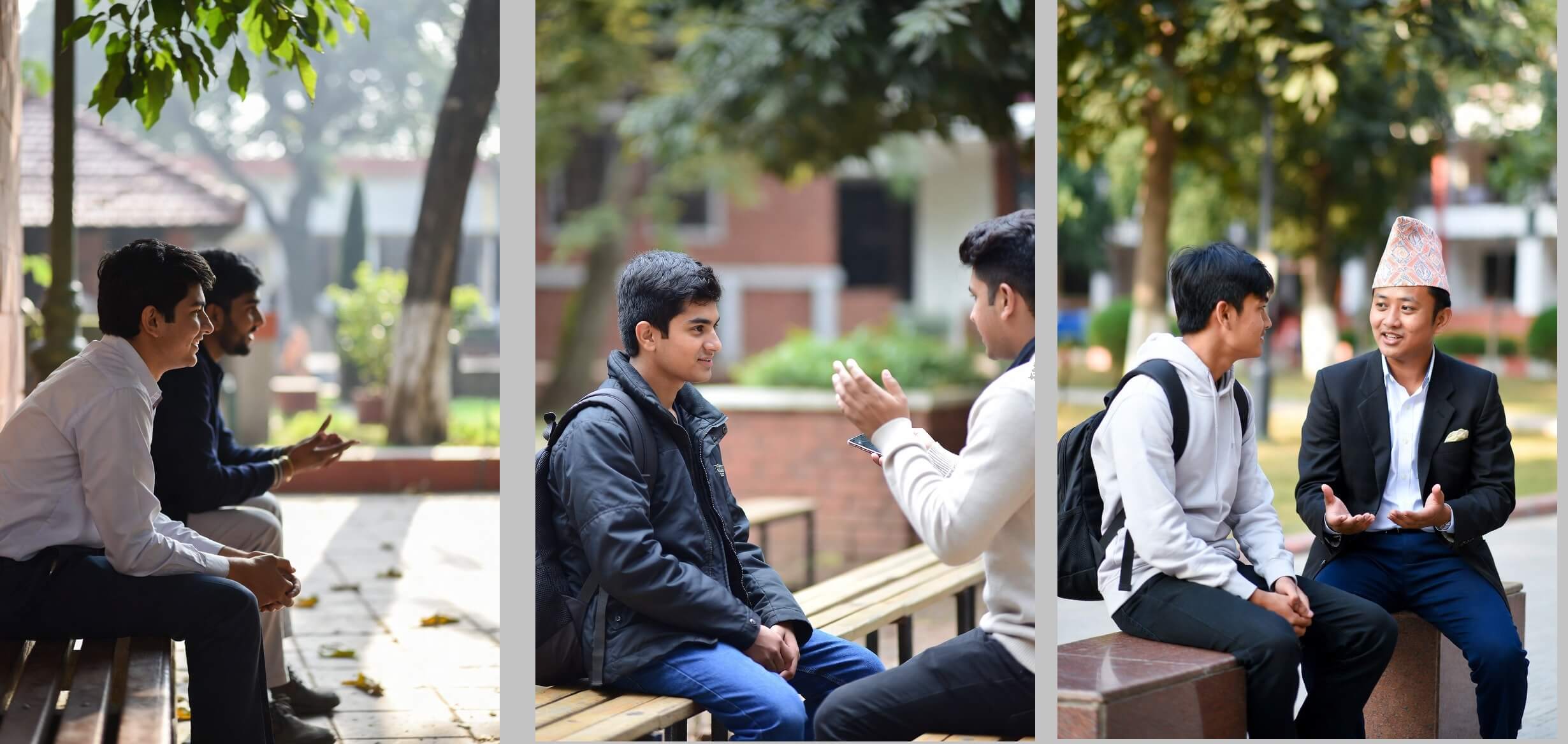
How Talking to Seniors for 5 Minutes a Week Can Change a Student’s Mindset
Students often picture guidance as a long counselling session or a big formal mentoring program. In daily campus life, change often starts in a different way: a quick talk in the corridor, a short call with an older cousin, or a message reply from a final-year student.
When you talk to seniors for five focused minutes each week, you tap into experience that took them years to collect. You hear what worked, what failed, and what they would do differently. Those small pieces of insight gradually reshape how you think about study, work, and your own abilities.
We can think of these talks as small adjustments to a compass. Each conversation nudges direction a little. Over a semester, those small shifts add up. You may still face pressure and confusion, yet your inner voice starts sounding calmer and more informed.
In this context, “seniors” include:
-
Older students in your program
-
Alumni who completed the same course
-
Teachers, teaching assistants, or early-career professionals
-
Older adults in your family or community with relevant life experience
The shared link is simple: they have walked through exams, choices, and pressure that look very similar to what you face now.
What Research Tells Us About Mentoring and Mindset
Evidence from education, psychology, and intergenerational work consistently points in the same direction: supportive contact with seniors helps students think and feel differently about learning.
Self-Belief and Academic Progress
Universities in different regions have studied peer and near-peer mentoring programs, where older students regularly support younger ones. Many of these studies report gains in:
-
Academic self-efficacy (belief that “I can handle this course”)
-
Adjustment to campus expectations
-
Satisfaction with the study experience
When you speak to someone who has passed the subjects you are worried about, your brain receives a clear message: progress is possible. That feeling translates into more productive study habits, better use of support services, and a stronger willingness to keep going through difficult weeks.
Belonging and Emotional Safety
Research on retention shows that students who feel they belong to a learning community are more likely to stay and complete their course. Regular contact with seniors reduces the sense of being an outsider.
You hear that others once felt lost during first-year labs, sleepless before presentations, or unsure about a major. Your own worry starts to look less like a personal weakness and more like a normal phase. That shift in interpretation reduces shame and makes it easier to seek help early.
Perspective from Older Adults
Intergenerational programs link students with older adults in communities, care homes, or neighbourhood networks. Evaluations of such programs often highlight:
-
Better mood and purpose for older adults
-
Wider perspective and empathy for young participants
-
Greater understanding of how people rebuild their lives after setbacks
When you listen to an older adult talk about changing careers, coping with illness, or supporting a family on a low income, short-term academic stress sits in a larger story. Your current exam still matters, yet it no longer feels like the entire future compressed into one week.

How Five Minutes Can Reshape Your Inner Story
Mindset is the story you tell yourself about who you are and what you can do. Short, honest conversations with seniors feed that story with new material.
From Confusion to Clearer Options
Many students say, “I have no idea what to choose next.” Seniors usually carry a chain of specific events:
-
Why they selected a branch or major
-
What surprised them once they began
-
When they realised a different option suited them better
After listening, your question changes. Instead of “What if I choose the wrong path forever?”, you start asking “Which option fits my current strengths, interests, and limits?” That question invites exploration, not panic.
From Fear of Failure to a Learning Focus
Silent fear grows when you believe that one mistake will ruin everything. Seniors often talk about:
-
Subjects they passed on the second attempt
-
Internships that did not go well
-
Projects that looked promising and then collapsed
Hearing those stories teaches you that progress often includes retakes, repairs, and new plans. You start to treat feedback and setbacks as information, not as a verdict on your worth. That is the heart of a learning-focused mindset.
From Isolation to Community
Students under stress frequently feel alone. When you talk with seniors, you find out how common those feelings are. A final-year student may say:
-
“I nearly dropped this course in second year.”
-
“I felt out of place in my first semester here.”
Those sentences act like a bridge. You feel part of a shared community of learners instead of a single person stuck in private struggle. That sense of connection supports mental health and keeps you engaged with your course.
From Short-Term Panic to Long-Term View
Academic life often centres around the next test or deadline. Seniors can widen that frame. They remember:
-
How one weak semester balanced out across an entire degree
-
How skills from a demanding subject later helped in job interviews
-
How small side projects opened work opportunities years later
When you hear such stories, grades remain relevant, yet they sit inside a longer timeline. That longer view makes daily stress easier to manage.
Building Your Weekly Five-Minute Habit
Short talks turn into mindset change when they follow a regular pattern. A weekly rhythm works well for most students.
Who Counts as a Senior for You
Your senior might be:
-
A student a year or two ahead of you
-
An alumni member who responds in a college group or on a professional platform
-
A teaching assistant or young lecturer
-
An older sibling, cousin, or neighbour with experience in study or work
You can choose different seniors for different topics. One person for exam strategy, another for internships, and someone older for life decisions. Think about whose story feels relevant and whose style feels respectful.
Simple Three-Step Conversation Flow
A light structure makes five minutes useful instead of random. You can follow this pattern.
Before You Talk
Spend one or two minutes asking yourself:
-
What is the main question in my mind this week?
-
How do I feel about it right now? (anxious, stuck, curious, frustrated)
Write one clear question in your notes. For example:
-
“How did you choose your electives in third year?”
-
“What helped you when your grades dropped?”
Clear questions help seniors share specific, practical answers.
During the Five Minutes
When you meet or connect online, open with a short, polite line:
-
“You completed this subject last year. May I ask one quick question about how you studied it?”
Then ask your prepared question. Give space for a full answer. You can follow with one brief follow-up if needed, such as “What would you do differently if you were in my year again?”
Your role during this time is to listen, not to defend your current habits.
After the Conversation
Soon after you finish, write down:
-
One idea that surprised you
-
One idea that confirmed something you already sensed
-
One action you will try in the next seven days
This small reflection step turns a short talk into a personal learning moment.
Questions You Can Ask Seniors
Many students freeze when they finally meet a senior, then walk away wishing they had asked something else. A small bank of questions removes that pressure.
Study and Academic Choices
-
“If you had to study this subject again from the start, what would you change?”
-
“Which habits saved you time during exams?”
-
“How did you handle topics that felt dry or hard to focus on?”
Career and Skill Growth
-
“How did you find your first internship or training opportunity?”
-
“Which skills outside the syllabus helped you at work?”
-
“What would you start learning in my place if you had six months free?”
Mindset and Well-Being
-
“When you felt close to giving up, what kept you moving?”
-
“How did you deal with comparison with toppers or more confident classmates?”
-
“What helped you keep some balance between study, sleep, and family life?”
You do not need to ask many questions. One honest question per week already builds a rich collection of insights over time.

Real-Life Patterns from Student–Senior Conversations
Every campus and community has its own stories. Certain patterns still appear often in mentoring work.
First-Year Worry
A first-year student shifts from school to college and feels pressure from the jump in pace. A short talk with a senior reveals that they too felt lost at the start, then improved after forming a small group that met twice a week to review notes. The junior realises that confusion at the beginning is common and that active connection with peers can make the load lighter.
Mid-Course Doubt
Around the middle of a degree, many learners question their major or specialisation. In a five-minute chat, one senior shares how they tested two interests through small projects and part-time roles before choosing one. The junior picks up a practical formula: run small experiments, then decide, instead of trying to think out every possible future in one sitting.
Final-Year Pressure
In final year, concerns about work and next steps grow stronger. A series of short weekly calls with an alumni member gives a student simple routines: a fixed time for job search, a way to prepare for interviews in small steps, and healthy ways to handle rejection messages. That consistent support reduces anxiety and helps the student act instead of freezing.
Common Barriers and How We Can Handle Them
Knowing the value of senior conversations does not automatically make them easy. Many learners face internal and external barriers.
Shyness and Language Concerns
You may worry that your question sounds “too simple” or that your language skills are weak. One way to ease that fear is to start with someone who already feels friendly: a lab senior, a club member, or a relative. A clear, polite opener helps:
-
“I am trying to plan my next semester. Could I ask you one question about how you did it?”
Short, direct language communicates respect and seriousness without any special style.
Hierarchy and Respect
In some cultures and institutions, seniority has strong rules. That can create distance. Respect helps bridge it:
-
Use appropriate titles or forms of address
-
Avoid interrupting or debating during the first contact
-
Thank them at the end for their time
At the same time, respect flows both ways. If a senior speaks in a way that feels belittling or unsafe, you have the right to step back, end the conversation politely, and look for guidance from someone you trust.
Unhelpful Advice and How to Respond
Not every senior gives balanced or current advice. Some may project their own fears, telling you that no one succeeds from your background or that only one path counts. In such cases:
-
Treat their words as one viewpoint
-
Compare their situation with your own
-
Gather more perspectives from other seniors, teachers, or counsellors
We encourage you to build a small circle of seniors instead of depending on a single voice. Different stories allow you to see a wider picture and make decisions that truly fit you.
Turning Conversation into Action
Conversation changes mindset when it leads to action and reflection.
Reflection That Builds Insight
A simple reflection routine strengthens your learning:
-
Write a few lines after each talk, even if you feel tired
-
Share the most helpful insight with a close friend; teaching adds clarity
-
Review your notes once a month to spot patterns
Over time, you may notice that the same themes keep appearing. For example, several seniors might stress consistent revision over last-minute study. Repeated messages both inform and motivate.
Four-Week Starter Plan
You can treat the first month as a trial. Here is one example structure:
-
Week 1: Ask a senior about handling a current difficult subject.
-
Week 2: Ask someone older about electives, specialisations, or side skills.
-
Week 3: Ask about stress, sleep, and handling pressure before exams.
-
Week 4: Ask an older adult in your family or neighbourhood about a key decision they made at your age.
After four weeks, check:
-
Do you feel more connected to your course and community?
-
Do your worries feel more organised and less chaotic?
-
Did you act on at least one suggestion?
This review tells you whether the habit is working for you.
Signs Your Mindset Is Shifting
Signs of change might look like:
-
Stronger belief that you can improve with effort and support
-
Earlier help-seeking when trouble appears
-
More concrete plans instead of vague worry
-
Greater patience with yourself during rough weeks
These shifts show that your inner story is turning from fear and shame toward growth and self-respect.
How Families and Institutions Can Support This Habit
Mindset belongs to each student, yet the wider environment plays a large role.
Near-Peer Mentoring in Schools and Colleges
Schools and colleges can:
-
Set up buddy systems linking first-year students with seniors
-
Offer group sessions where juniors ask questions in a moderated space
-
Give recognition to seniors who support juniors in healthy ways
Such programs help you feel that help is part of the culture, not a personal favour.
Connecting with Alumni and Community Elders
Institutions and families can:
-
Invite alumni to speak in small discussion circles, not only big talks
-
Encourage students to interview elders about career, money, and community service
-
Support youth–elder projects, such as shared reading circles or skill exchanges
These contacts widen your network, give access to new viewpoints, and strengthen community ties.
Ground Rules That Protect Everyone
For conversations to stay safe and useful, clear ground rules help. Examples include:
-
Voluntary participation for both students and seniors
-
Respect for privacy and personal limits
-
Channels for feedback if any interaction feels harmful
When such ground rules are visible, you can reach out more confidently.
Key Takeaways You Can Apply This Week
A simple habit can start right now. You can:
-
Pick one senior or older adult you already know
-
Prepare one honest question about study, career, or mindset
-
Ask for five minutes and keep to that limit
-
Listen fully, note one useful idea, and try one small action
-
Repeat next week with the same person or someone new
We, as educators, mentors, parents, and seniors, can support you by staying approachable and honest about our own stories. Growth then becomes a shared process instead of a private struggle.
Closing Thoughts
Change in student mindset rarely arrives through one dramatic event. In many lives, it arrives through a quiet pattern: steady, short conversations with seniors who care enough to tell the truth. When you build a weekly five-minute habit, you invite those stories into your own path.
You still make your own choices. You still carry your own responsibilities. The difference lies in the quality of guidance you receive along the way. Talking to seniors gives you maps drawn from real journeys, so your path feels less lonely and far more informed.
Frequently Asked Questions
1. How do I start talking to a senior without feeling awkward?
Begin with a clear, simple request. You can say, “You studied this subject earlier. May I ask one quick question about how you handled it?” A direct purpose and a short time frame make the interaction easier for both sides. Most seniors remember similar doubts and respond with kindness.
2. What if I do not know any seniors personally?
Look at spaces where seniors already interact with juniors: student clubs, lab groups, tutorial sessions, online alumni groups, or community events. You can also ask a teacher or counsellor to introduce you to an alumni member who is open to short student conversations. One introduction often leads to more contacts over time.
3. How long does it take before I notice a change in my mindset?
Many students report a shift after three or four weeks of regular five-minute talks plus reflection. You may feel less alone, more informed, and more willing to act. The habit works like exercise for your thinking patterns: small sessions, repeated steadily, reshape how you respond to study and life.
4. What should I do if advice from two seniors conflicts?
Treat each piece of advice as one data point. Compare it with your values, strengths, and limits. You can write pros and cons for each suggestion, then discuss your thoughts with a trusted adult, mentor, or counsellor. In the end, decisions still belong to you; senior advice plays a guiding role, not a controlling one.
5. Can online conversations with seniors help as much as face-to-face meetings?
Short online talks through messages, voice calls, or video calls can support mindset change when they are focused and respectful. You can ask clear questions, receive thoughtful replies, and reflect afterward in the same way as with in-person meetings. Online spaces also allow you to reach seniors in other cities or countries, which widens your view of future study and work options.
Motivational Topics Students Study Motivation

